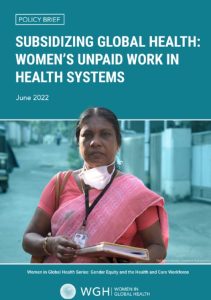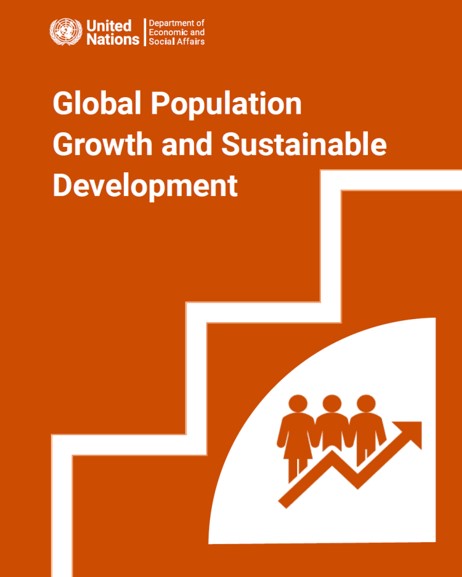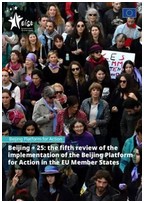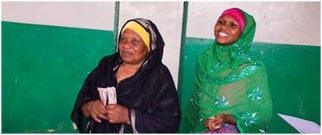Women’s Unpaid Work in Health Systems: Subsidizing Global Health

Direct Link to Full 37-Page 2022 Report:
Pay-Women-Report-July-7-Release.pdf (womeningh.org)
We Need to Value Women’s Unpaid Work in Health Systems
The new report from Women in Global Health found that 6 million unpaid women support health systems.
July 6, 2022 – Women make up 90% of frontline health care workers globally — and those in unpaid roles are grossly underpaid yet continue to hold health systems together in the wake of the COVID-19 pandemic, according to a new report.
The report, “Subsidizing Global Health,” was published by the nonprofit organization Women in Global Health and compiled from existing research and interviews with women health workers in Ethiopia, India, Malawi, Mexico, and Zambia. The report exposed a stark lack of data about women working unpaid in health systems.
There is a direct correlation between women’s lack of equal pay within the industry, extreme stress on health systems, and health care workers leaving the field, Dr. Magda Robalo, the managing director at Women in Global Health, said in a press release issued to Global Citizen.
“Women would choose to be paid if they had that choice,” Robalo said. “Underpaying or not paying them is not only a violation of economic justice, it is poor policy to engage a large proportion of your workforce under unacceptable working conditions. It is no wonder that so many are leaving the profession.”
Women in Global Health recommends collecting accurate data on unpaid and underpaid health workers and creating decent jobs for all women in the formal health workforce, in order to increase gender equality and promote women’s economic empowerment by closing the projected 18 million global health worker gap that is threatening global health security.
Here are six more key takeaways on the state of women’s unpaid work in health care from the report.
- An estimated 6 million women worldwide are subsidizing health systems with their unpaid or grossly underpaid labor.
While men also occupy unpaid health roles, the vast majority are women, and the gender pay gap would be even wider if the full amount of work by unpaid women workers were included in labor market statistics.
Calculating the actual number of women working unpaid and underpaid in health systems is limited due to inadequate data and information. Typically, women in unpaid roles are from low-income families, have limited education, and work as community health workers.
- Women in unpaid roles face higher safety risks inside and outside the workplace.
Women in health care who are unpaid tend to hold the lowest status in the workplace and are the first to work on the front lines without basic personal protective equipment, for example, putting them at an increased risk of disease.
They may also be exposed to violence in the community if they are perceived as having low status or working late hours. What’s more, unpaid work can increase the risk of intimate partner violence. When women lack financial independence, they are less likely to leave abusers and may be forced to stay in unsafe relationships longer.
- Women’s unpaid work helps keep communities safe.
Strong evidence shows that unpaid work performed by women in health systems has positive health outcomes for other groups, including women and children in their communities. During the COVID-19 pandemic, women have carried out tasks like contact tracing, distribution of public health messaging, and vaccine delivery.
- Women living in low-income countries are more likely to take on unpaid work.
Around one-quarter of the women working unpaid in health are in India, where 60% of the population lives in poverty. The COVID-19 pandemic has exposed the prevalence of informal work in health care, especially in low-income countries where women workers are often categorized as “volunteers” or “community activists” and go unrecorded in formal labor market statistics.
Vulnerable women from very poor households and marginalized groups may have even fewer choices than other women in the community and take on unpaid work with long hours hoping it will earn them a formal role.
- Unpaid work undermines women’s economic rights and potential.
Working outside the formal sector deprives women of social protection and other benefits. Women in unpaid roles in low-income countries are less likely to have the qualifications to enter the formal job market. Even when women are educated, their opportunities to find work in the formal sector outside their communities are limited by a lack of mobility.
- Health systems are weakened by depending on women’s unpaid work.
Unpaid health workers are often less reliable and compromise health security. When unpaid women workers are unable to progress into careers in the formal health sector, talent and expertise are lost to the health system. Health care systems based on safe and decent work result in better long-term health outcomes.
Извор: WUNRN – 07.07.2022



